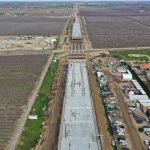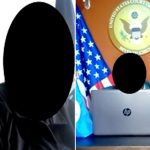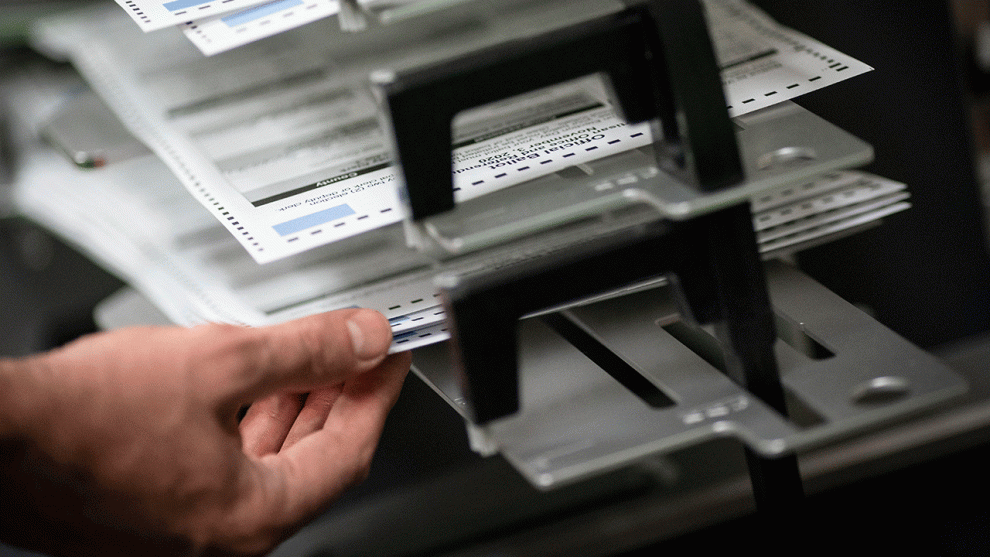A Wisconsin judge on Tuesday ordered the state elections commission to implement his ruling allowing election clerks to accept absentee ballots that have partial witness addresses, a decision that is expected to expand the number of ballots that will be counted in the battleground state.
Each of the last two presidential elections in Wisconsin was decided by fewer than 23,000 votes. Polls show another razor-tight race this year between President Joe Biden and former President Donald Trump.
Ever since Trump’s defeat in Wisconsin in 2020, Republicans have been fighting in court to tighten the rules to limit how many absentee ballots can be accepted.
State law requires absentee ballots to be submitted with a witness’ signature and address on the outside envelope that contains the ballot. Three separate lawsuits were filed related to those rules.
Dane County Judge Ryan Nilsestuen earlier this month ruled, in two cases brought by liberals, that a ballot can still be accepted even if a witness address omits municipalities and ZIP codes, or simply say “same” or “ditto” if the witness lives with the voter. The Republican Legislature fought to have the case dismissed.
Nilsestuen on Tuesday ordered the elections commission to approve guidance no later than Feb. 9 that would direct clerks on what ballots can be accepted. Nilsestuen stressed that he wanted to move quickly given the upcoming Feb. 20 primary for local elections. Wisconsin’s presidential primary and spring general election is April 2.
The Republican-dominated Legislature’s attorney, Kevin LeRoy, said he planned to ask for the ruling to be put on hold pending an appeal. The judge scheduled a Friday hearing on that.
The case is expected to go to the Wisconsin Supreme Court.
But first, the state elections commission will likely vote Feb. 8 on approving guidance for Wisconsin’s more than 1,800 local clerks in line with the judge’s order. The local clerks are the ones who run elections and receive the absentee ballots that don’t always have all of the witness address information.
“We’ll try to turn it around as fast possible,” Thomas Bellavia said. “WEC wants this system to work.”
The elections commission published guidance in 2016 saying that a witness address “contain at a minimum, a street number, street name and municipality,” but that clerks could fill in missing address information, known as ballot curing. The practice was unchallenged until after Trump’s narrow loss in 2020 when he tried to have more than 220,000 absentee ballots tossed out in an unsuccessful attempt to overturn his defeat.
Among those he wanted to not count were about 5,500 absentee ballots where clerks filled in missing information on the witness’ address.
The Wisconsin Supreme Court ruling in December 2020 rejecting Trump’s lawsuit noted that state law wasn’t clear on what constitutes an address for witnesses.
A Waukesha County judge sided with Republicans in 2022 and ruled that election clerks can’t fill in missing address information on absentee ballot envelopes. The elections commission withdrew its guidance following that ruling.
However, the judge did not say in that order what constitutes an address.
That led to the filing of a pair of related lawsuits in Dane County, which argued that because there was no longer any state guidance, and the Waukesha County ruling didn’t say what counts as a complete address, clerks didn’t know what to do.
The lawsuits were filed by Rise Inc., a liberal group that mobilizes young voters, and the League of Women Voters of Wisconsin.
The judge on Tuesday spelled out four ways a witness address could be accepted with some missing information.
WISCONSIN GOP TO PROPOSE TAX CUTS FOR FAMILIES EARNING UP TO $200K
He said that a witness address can be accepted if it includes the street number, street name and municipality, but neither a state name nor a ZIP code or with everything except a municipality and state name. It would also be acceptable if the witness includes the same street number and street name as the voter, but no other address information is provided.
And it would also be allowed if the witness indicates their address is the same as the voter’s by saying “same,” “same address,” “same as voter,” “same as above,” “see above,” “ditto,” or by using quotation marks or an arrow or line pointing to the other address.
The Legislative Audit Bureau in 2021 reviewed nearly 15,000 absentee ballot envelopes from the 2020 election across 29 municipalities and found that 1,022, or about 7%, were missing parts of witness addresses. Only 15 ballots, or 0.1%, had no witness address. Auditors found that clerks had corrected addresses on 66 envelopes, or 0.4% of the sample.
























